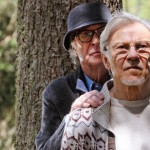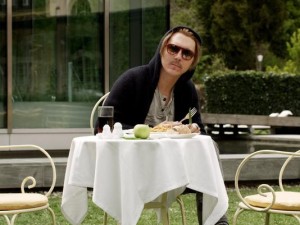by Peter Callaghan
An Englishman and an American walk into a spa (I presume the bar was closed and Paddy and Jock were otherwise engaged). “Did you take a piss today?” asks the Englishman. “Twice,” replies the American. “Four drops.” A pause. Of the Harold Pinter variety. “You?” “Same,” replies the Englishman, before adding, after lengthy consideration, “More or less.” “More or less?” “Less.” A comedic exchange reminiscent of Waiting for Godot with Michael Caine as the retired composer Fred “I’ve grown old, but without understanding how I got here” Billinger in the role of the inert Estragon and Harvey Keitel as the Hollywood filmmaker Mick “I know everything there is to know about love” Boyle in the role of the restless Vladimir.
Writer and director Paolo Sorrentino, who won an Academy Award, Golden Globe and BAFTA for his 2013 masterpiece La Grande Bellezza (The Great Beauty), has once again teamed up with his long time cinematographer Luca Bigazzi to create a rare work of beauty which is visually stunning to the eye, as dry as a bone and shines a poetic light on similar weighty themes of loneliness and yearning, regret and fear, how to find meaning and happiness in our threescore years and ten and how to negotiate our inevitable passage as we sail (gentle or raging) into that good night. Or as Fred bluntly puts it: “Desire. So pure, so impossible, so immoral. But it doesn’t matter, because that’s what makes us alive.”
Michael Caine and Harvey Keitel are terrific, particularly Caine who delivers one of his finest performances in decades. Holed up in a highly expensive but far from exciting health spa deep in the Swiss Alps, the septuagenarian creative reminisce about the women in their lives and the careers that they have carved, particularly their shared attraction towards the mysterious Gilda Black who Fred fell in love with and about whom Mick parked his desires out of respect for his friend’s feelings. At least, that’s what Mick believes. But if truth were told, “the real tragedy” is not that he slept with her, but that it was so long ago he can’t even remember.
and Harvey Keitel are terrific, particularly Caine who delivers one of his finest performances in decades. Holed up in a highly expensive but far from exciting health spa deep in the Swiss Alps, the septuagenarian creative reminisce about the women in their lives and the careers that they have carved, particularly their shared attraction towards the mysterious Gilda Black who Fred fell in love with and about whom Mick parked his desires out of respect for his friend’s feelings. At least, that’s what Mick believes. But if truth were told, “the real tragedy” is not that he slept with her, but that it was so long ago he can’t even remember.
Three other women in the last of the red-hot lovers’ lives are: Fred’s daughter Lena (Rachel Weisz) who has just been dumped by Mick’s son in favour of Cockney pop star Paloma Faith who, according to Mick, is “the most insignificant woman on the face of the planet”, but in the eyes of her newfound boyfriend is “really good in bed”; Miss Universe (Mădălina Diana Ghenea) who raises more than an eye when she strips to her birthday suit and slips seductively into the pool (one of the many female nude scenes which teeter on the brink of unnecessary voyeurism); and his gravely ill wife who as a former soprano of international note has been reduced to a mute invalid with dead eyes and an expressionless face.
 The final object of Mick’s desire is Jane Fonda in a glorious cameo as his muse and former leading lady Brenda Morel. “You look fabulous,” gushes Mick. “The very picture of radiance and sex appeal.” “You’re getting mixed up with the last millennium,” her withering reply before telling him in no uncertain terms that she does not want to appear in his swan song – his so-called “masterpiece” and “testament” Life’s Last Day – because his last three films were “shit” and she is turning her back on film for a television series which will earn her enough money to settle her idiotic husband’s debts, pay for her troubled son’s latest drug rehabilitation programme and still leave her enough left over to buy a house in Miami. To quote Brecht: “Food is the first thing, morals follow on.”
The final object of Mick’s desire is Jane Fonda in a glorious cameo as his muse and former leading lady Brenda Morel. “You look fabulous,” gushes Mick. “The very picture of radiance and sex appeal.” “You’re getting mixed up with the last millennium,” her withering reply before telling him in no uncertain terms that she does not want to appear in his swan song – his so-called “masterpiece” and “testament” Life’s Last Day – because his last three films were “shit” and she is turning her back on film for a television series which will earn her enough money to settle her idiotic husband’s debts, pay for her troubled son’s latest drug rehabilitation programme and still leave her enough left over to buy a house in Miami. To quote Brecht: “Food is the first thing, morals follow on.”
Luca Bigazzi’s cinematography is simply stunning, with each frame and vignette meticulously constructed and a work of art in their own right. The performances are a joy, including Roly Serrano as a bloated Diego Maradona and Paul Dano as pretentious method actor Jimmy Tree. And the humour is wonderfully droll. “At my age,” says Fred, “getting in shape is merely a waste of time. And I would get even more bored.” But unlike The Great Beauty, director Paolo Sorrentino lingers too long on the image and ends each sequence of shots in the same formulaic manner with a pithy philosophical aside followed by a medley of stark images underplayed with an ethereal ‘soundscape’ that the longer the film goes on the more (not tiresome, but) repetitive it becomes. As Fred says about his fathering skills, “Tremendous efforts. And all for the most modest results.”
[imdb id=”tt3312830″]
- REVIEW: Orphans @ Edinburgh King’s Theatre
- 13th April 2022
- REVIEW: Everybody’s Talking About Jamie @ Edinburgh Festival Theatre
- 30th March 2022
- REVIEW: Sheila’s Island @ Edinburgh King’s Theatre - 2nd March 2022










